Amy Javens: Not Your Typical Ironman
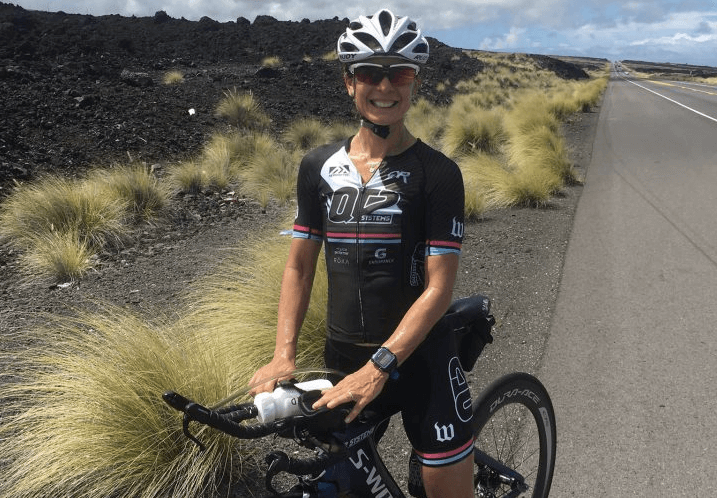
By Devin Javens, Swimming World College Intern.
In 2006, Amy Javens competed in her first ever Ironman at 34 years old in Madison, Wis. She didn’t expect much but wanted to accomplish a goal she had set for herself: to finish a full Ironman. Little did she know, she would still be involved in the sport of triathlon 12 years down the road, earning her “pro card” at the age of 40. She became a multiple-time qualifier in the half and full distance Ironman World Championships and a certified triathlon coach for QT2 Systems.
Amy’s story is particularly intriguing because her late entrance into the sport and minimal swimming experience truly displays the hardy work ethic of a supposed “underdog.” Following the Ironman World Championship in Kona, Amy was able to answer Swimming World’s questions about her experiences in athletics – particularly Ironman events – and find out what her life as a professional athlete and coach has taught her along the way.
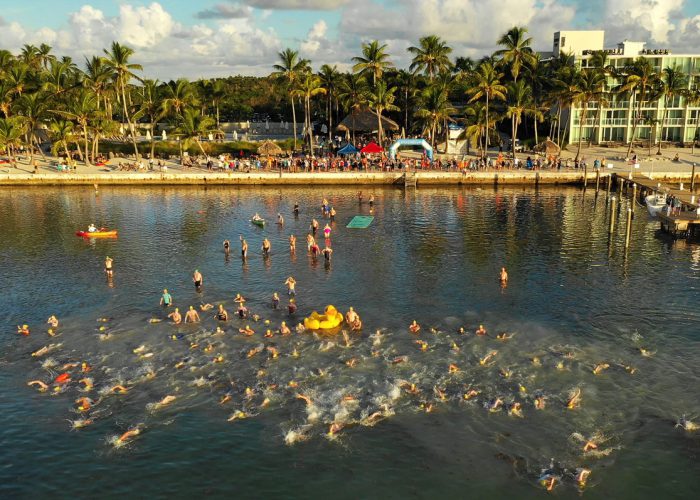
Photo Courtesy: Bob Care
Swimming World: What is your background in athletics?
Javens: In my younger years, I played lots of backyard sports with my older siblings: basketball in the driveway, wrestling with my brothers in the family room, running and riding bikes around the neighborhood and did lots of hiking in the woods around my childhood home. In my elementary years, I played softball and basketball. In high school, I played basketball, ran cross country and did track and field. I was a hurdler and ended my high school career as the Pennsylvania State Champion in the 300 meter hurdles.
I went on to run in college. As an adult, I have qualified for multiple age group Half Ironman and Ironman World Championships and was the 2017 Ironman Los Cabos overall female champion. As a professional, I had several podium finishes and won my first professional Iron-distance race at Beach to Battleship, North Carolina in 2015. Last year, I went back into the age group competitions when I turned 45.
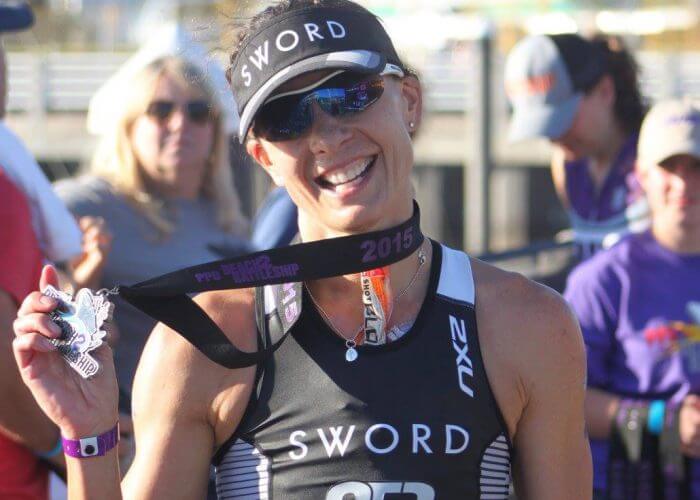
Photo Courtesy: Facebook, Amy Perman Javens
SW: What made you decide to try out triathlons?
Javens: I started to do endurance sports – particularly marathons – in my early 30s. To ease the likelihood of frequent running injuries, I decided to give cross training a try, particularly swimming and biking. I had no clue how to swim well and only took had taken some Red Cross swimming lessons as a child. I was a “nose plugger,” hated to put on a bathing suit and walk on cold and wet pool deck floors! I participated in some basic swim lessons as an adult so I could learn how to swim freestyle somewhat efficiently and made bits and bits of improvement from there. Once I was able to swim consecutive laps in the pool, completing a triathlon was the most logical step to take, since I already ran and knew how to bike!
SW: During the beginning of your triathlon career, did you ever envision yourself competing in Ironman events and becoming a professional triathlete?
Javens: Yes and no. I was always intrigued with the Ironman triathlon and made it a quick goal to complete one in my earlier years of triathlon. However, little did I know that it would lead to a career and life as a professional triathlete and triathlon coach. I was an educator by trade and coached basketball and track for many years, so transitioning into coaching triathlon was a natural process as I dove more into the sport and surrounded myself with very good mentors.
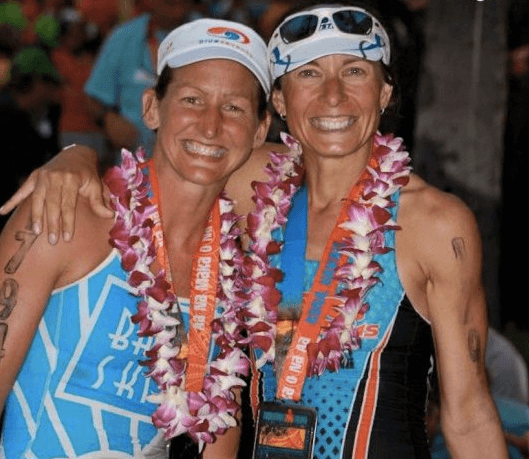
Photo Courtesy: Facebook, Amy Perman Javens (Right)
SW: What made you want to make a career out of competing and coaching?
Javens: I was taught at a young age to find something I was passionate about, always work hard at it and to surround myself with others who I could learn from. I was passionate about triathlon and placed myself in situations among mentors and in environments from which to grow and learn. My decision to go professional was more of a “process” decision and not an “end-goal” decision. As an educator, I value the process of learning new things and becoming efficient and knowledgeable at a trade.
I knew I would not be a top pro triathlete due to my age and limited early exposure to the sports; however, by competing and training among some of the best, I was pushed to become my best. As the saying goes, “You are who you surround yourself with.” I surrounded myself with Ironman champions and coaches who coached these Ironman champions. By doing this, I have grown and have continued to grow as an athlete and coach. Currently, I am a USA Triathlon certified coach with QT2 Systems.
SW: How different was your training and race strategy for your first Ironman versus your last?
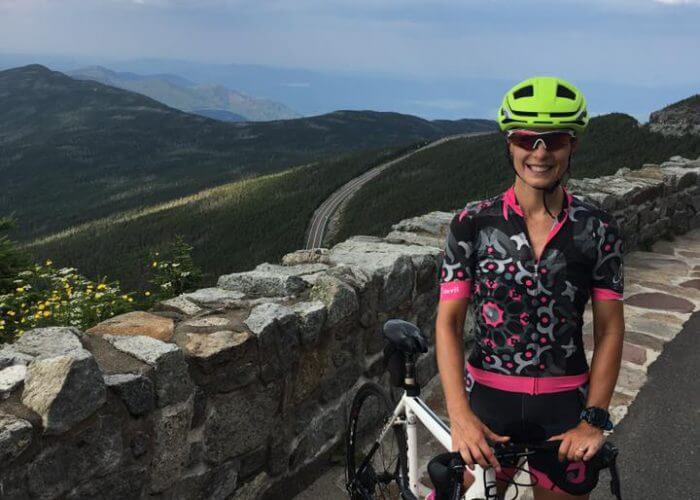
Photo Courtesy: Facebook, Amy Perman Javens
Javens: In some ways the same, in other ways way different! Consistency has always been a theme to my training, so from the very beginning of my triathlon career, I had embraced consistency in my training and a hard work ethic and focus. What was different is that I began training by heart rate, running pace and bike power.
Once I became more serious and the sport went beyond being a hobby for me, I went from being a self-coached athlete to a coached athlete. At this level, it is important to find an experienced and certified coach and system who has a track record of producing results. It helps streamline the process of improvement in sport. Shopping for a coach should not be taken lightly. Ironman triathlon training is a big time money investment, so choose a coach who has no strings attached and who will not sell you on other things besides good coaching. It is also crucial to find a coach who you can relate to, is honest and doesn’t give up on you when you may feel you want to give up on yourself. Currently, my triathlon coach is Vinny Johnson with QT2 Systems.
As my training became more and more demanding than the training from my earlier years, it was important to surround myself with a high quality strength coach, a mental coach/sport psychologist and a body work team (massage therapist, physical therapist, chiropractor). This team keeps me healthy in all of these domains.
Another thing that is different is that the more serious I became in the sport, the more I placed myself in environments – such as camps – that allowed for focused and concentrated periods of training builds. Over my competitive years, I have trained at camps in Florida, Texas, Vermont, Lake Placid and California. All were key in boosting my fitness levels for goal races.
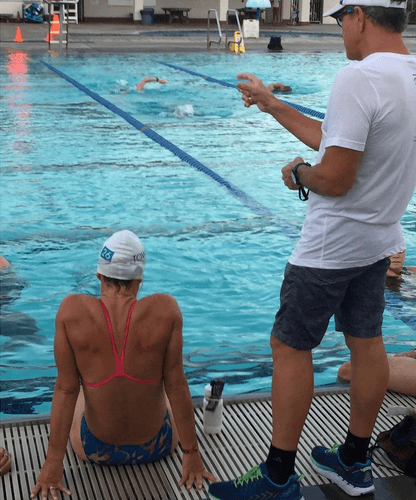
Photo Courtesy: Facebook, Amy Perman Javens
SW: How did you teach yourself to swim as an adult?
Javens: Swimming has always been a limitation for me in triathlon. I came from a running background and cycling is my strength; unfortunately, swimming did not come so easy for me. I missed those critical years of learning how to effectively swim at a younger age, so training the body to swim as an adult was very challenging for me. I didn’t even know how to do freestyle or breathe without a nose plug. While taking my daughters to water babies classes as infants, I observed how the instructors taught the babies to correctly breathe by blowing bubbles. That is how I learned how to breathe – in water babies classes! Ha! After I got the breathing mastered, I took swim classes from there.
SW: What did you do to try to improve your swimming throughout your career?
Javens: One thing I do wish I could have done earlier was to get involved with a USA Swimming Masters program earlier in my triathlon career. I did a lot of swimming by myself and developed a lot of bad habits. I joined a masters program two years ago, and having a second set of eyes on me in practice is very helpful. Having others to swim with is much more motivating and triathlon specific. At the Ironman World Championships in Hawaii, I have swum with anywhere from 800 to 2,500 athletes all at the same time.
This is why it is very important for me to get used to having lots of swimmers around when practicing swimming for triathlon. Besides frequenting Masters, I am also coached by a swim coach who specializes in triathlon and open water swimming out of Santa Monica (Gerry Rodrigues, Tower 26). Both entities have helped me strive to improve my swim.
SW: How have you evolved as an athlete from high school to now?
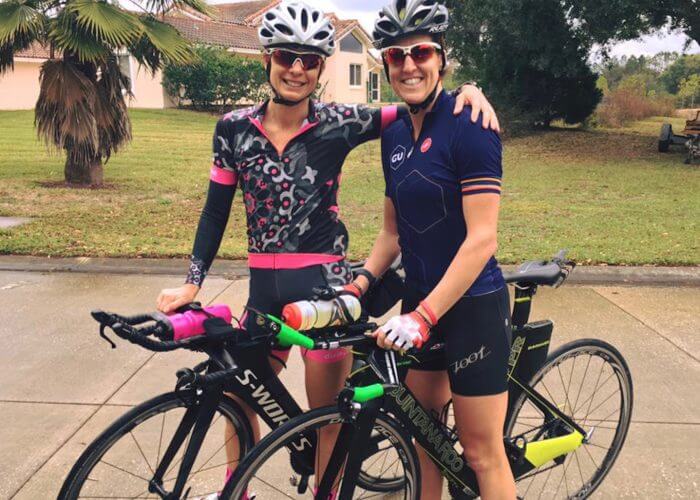
Photo Courtesy: Facebook, Amy Perman Javens (Left)
SW: What’s your favorite race moment?
Javens: I would have to say my favorite race moments were the ones where my family was with me. I seem to do a bit better when family is able to watch me compete. However, a few moments come to mind. Ironman Louisville 2012 was the race I competed in and qualified for my pro card. It was also a race I represented Team Blazeman, a group dedicated to spread awareness and raise funds for ALS disease. My father passed away from ALS, so doing a race in his honor meant a lot to me. I did the infamous Blazeman Roll at the finish line.
Another special moment was winning Ironman Cabo and Beach to Battleship with my family around. I appreciate that triathlon has also allowed me to travel all over the country and world to places like Australia, Hawaii, Mexico and more.



